Brian Clegg's Blog, page 45
February 5, 2017
Dirk Gently's Holistic Detective Agency review
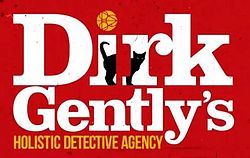 I was more than a little wary to see that Netflix had issued an eight-part series 'based on' the Douglas Adams titles Dirk Gently's Holistic Detective Agency and The Long Dark Teatime of the Soul, especially as these novels are very British, where this is a US-based series - but with a couple of quibbles, the result was very pleasing, sufficiently so that I've got through the whole thing in a couple of evenings. (It helped I was home alone.) And surprisingly this is because the TV show bears hardly any resemblance to the original books.
I was more than a little wary to see that Netflix had issued an eight-part series 'based on' the Douglas Adams titles Dirk Gently's Holistic Detective Agency and The Long Dark Teatime of the Soul, especially as these novels are very British, where this is a US-based series - but with a couple of quibbles, the result was very pleasing, sufficiently so that I've got through the whole thing in a couple of evenings. (It helped I was home alone.) And surprisingly this is because the TV show bears hardly any resemblance to the original books.There's something very odd about Douglas Adams's output. I'd suggest that each of his fictional series - The Hitchhiker's Guide to the Galaxy and Dirk Gently - only properly works in one format. The HHGTTG was a superb radio series, but for me seemed forced by comparison in book form, was so-so on TV and disastrous on film. When it came to Dirk, these were novels of ideas (in part cobbled together from unused Doctor Who scripts). They were far better books the Hitchhiker novels, but seemed flabby when the BBC attempted a TV version.
The reason I'd say that the new Netflix Dirk works so well is that it takes the single, bonkers, underlying concept of the holistic detective plus a dash of the Adams humour, and throws away pretty well everything else. The gap is filled by bolting on aspects of Twin Peaks, Orphan Black and even the brilliant movie, Galaxy Quest. It probably should have been a disaster, but it works remarkably well.
Those quibbles? I don't like series endings that are all about setting up the next series. And, in places, the director would have benefited from reigning in the acting, which is often over the top. But we've got an interesting core group of characters revolving around the eccentric, thankfully still English character of Dirk himself, and a storyline that has some delightful concepts. (A weaponised kitten? Come on!) There is time travel. There is detection. There is quite a lot of gore. And there's the pleasure of a plot that seems all over the place, only to gradually fall into place.
I'm looking forward to the next one (already commissioned)...
Published on February 05, 2017 07:48
January 30, 2017
How a crystallographer is responsible for my marriage
 A crystallographer (not my tutor)
A crystallographer (not my tutor)Image from WikipediaI was giving a talk at Bristol University last Wednesday about randomness and probability, based on my book Dice World . Following it, I got an email asking if I was really suggesting that everything that happens to us is just random, even, for instance, meeting someone and falling in love?
My response was that there is a mix of chance and choice. Chance is behind a meeting, but each party in such an occurrence then makes a series of decisions - choices - that influence the outcome. (You can argue whether those decisions are themselves pre-determined or if there really is free will, but I that's getting too philosophical for me.)
I gave my questioner the example that I would not have met, fallen in love with and married my wife if my tutor at university had not been a crystallographer.
When I started my Natural Sciences course at Cambridge I was expected to take four subjects. Three were pretty obvious - maths, physics and chemistry. But for the fourth I really wanted to do experimental psychology, as it sounded fascinating. But then I had a meeting with my tutor who, frankly, bullied me into taking crystalline state as my fourth topic. I hated the subject and dropped it as quickly as I could.
However, in an alternative universe where he had not interfered, I would have taken experimental psychology. With what I know of myself now, I believe I would have made that my specialist topic for the third year. And that means my career path would have been totally different. I wouldn't have gone on to do a Masters in operational research. As a result I wouldn't have got a job at British Airways. So I wouldn't have ended up living in a town called Langley, on the outskirts of Slough, which was handy for my place of work. And that was where I met my future wife.
I want to stress again that I'm not arguing for a life where everything is totally ruled by chance. But if we fail to acknowledge how much chance, randomness, luck - whatever you want to call it - sets up the starting position from which we have to make our decisions - we are living in a fantasy world.
Find out more about randomness, probability and their influences on our lives in Dice World .
Published on January 30, 2017 01:39
January 26, 2017
Breaking Breaking Bad
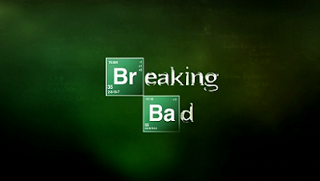 Netflix does all it can to understand its customers from what they watch, but I think in my case they will be more than a little confused as I have watched over 70 episodes of Breaking Bad. Yet I have never seen a single full episode of this 62 episode series.
Netflix does all it can to understand its customers from what they watch, but I think in my case they will be more than a little confused as I have watched over 70 episodes of Breaking Bad. Yet I have never seen a single full episode of this 62 episode series.Just in case anyone isn't aware of it, Breaking Bad has been one of the huge successes that Netflix has had with drama series. It features chemistry teacher Walter White, who takes to crime to support his family when he is diagnosed with inoperable cancer. I suppose you could describe it as a dark comedy drama. And behind my unusual viewing pattern is the magazine Good Housekeeping. What else?
For many years now, I have written occasionally technology pieces for the magazine (my first editor was the delightful Aggie MacKenzie of 'Kim and Aggie from How Clean is Your House' and Storage Hoarders fame), and my most overwhelming task has been to do a large scale review of laptops (over an extended period) for their online site. Bearing in mind that GH is not BitCruncher Monthly, I wanted any measures I used to be ones related to the kind of things ordinary users actually do on their laptops. Readers are relatively unlikely to be hardcore gamers or running intensive data manipulation programs. So to assess battery life, rather than use a battery life app, which inevitably takes a very abstract, artificial approach, I decided to test the impact of watching an episode of Breaking Bad with the screen on full brightness.
Watching videos is one of the most battery intense activities many of us make, so this seemed an ideal approach. The downside is that I was dependent on the manufacturers' battery gauges, which aren't always incredibly accurate, but all were given the same 100% starting point, and in the end a subjective measure is arguably desirable because it reflects actual user experience.
So, over 70 laptops have sat on my dining table, each watching the same episode (episode 2) of Breaking Bad. (If you're a burglar, I ought to stress I am no longer doing this testing and don't even own a laptop myself. And they weren't all there at the same time.) Frankly, I am now sick of Breaking Bad. To be fair, I haven't ever sat through that episode end to end. But I've watched the opening two scenes every time as I use them to judge video quality. (There's an excellent closeup of a tap in dim lighting in the first, and the second has both a caption and a wide shot of scenery with a vivid colour range, so it's a good test.) I have seen the closing scene (the one with the little girl and the gas mask) every time. And for some reason I have seen the scene with the bathtub far more than I want to.
People keep telling me I should watch Breaking Bad because it's great. And I'm sure it is. But, honestly, I just can't face it. And anyway, it would probably confuse Netflix's algorithms even more.
Published on January 26, 2017 00:17
January 23, 2017
It's not the media's fault we don't know our MEPs
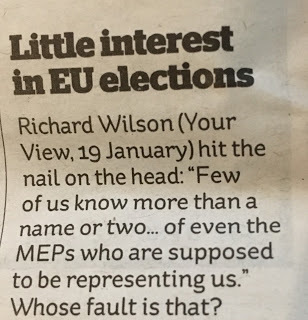 There was a letter in the
i
newspaper at the weekend from a former Lib Dem MEP candidate, agreeing with an earlier letter that few people know the names of their MEPs. 'Whose fault is that?' asks Charles Bidwell of Oxford. Well, apparently Mr Bidwell gave lots of briefing papers to the local press, which they ignored, although I'm sure they were fascinating - so apparently it's all the fault of the media.
There was a letter in the
i
newspaper at the weekend from a former Lib Dem MEP candidate, agreeing with an earlier letter that few people know the names of their MEPs. 'Whose fault is that?' asks Charles Bidwell of Oxford. Well, apparently Mr Bidwell gave lots of briefing papers to the local press, which they ignored, although I'm sure they were fascinating - so apparently it's all the fault of the media.However, I'd suggest Mr Bidwell entirely misses the point. Even if the media was full of details of our local MEPs, we still wouldn't know who they were. Because they have no significance to us.
I know who my local MP is. I've emailed him a good number of times and spoken to him face to face on several occasions. I've asked about some local issues, which he has taken action on, and I've joined with others in writing to him about key national issues, which I can't say for certain has changed his opinion, but at the very least I can feel sure has been considered when he has voted for things that affect us in parliament. I know who my MP is, because he can do things for me locally, and represent me in national votes which will make things happen.
Now let's contrast that with my MEPs (I presume under the confusingly complex system I have more than one, but I haven't a clue who they are). What can they do for me locally? Nothing whatsoever. They aren't representatives who do work in a constituency. What advantage will I have from bending their ear about matters facing Europe? None whatsoever, because their role is not to represent their constituents and sway decisions like a real MP. Why should I know their names? We have no point of connection.
Even amongst fervent remainers I'm sure there are many who, in their heart of hearts, wouldn't miss their MEPs. Because they really aren't part of our lives.
Published on January 23, 2017 01:53
January 22, 2017
An SF cracker - review
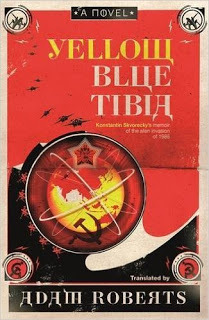 After enjoying
Jack Glass
and being blown away by
The Thing Itself
, I have been familiarising myself with the back-catalogue of science fiction writer Adam Roberts, and Yellow Blue Tibia is a cracker.
After enjoying
Jack Glass
and being blown away by
The Thing Itself
, I have been familiarising myself with the back-catalogue of science fiction writer Adam Roberts, and Yellow Blue Tibia is a cracker.At first sight, the plot starts brilliantly but veers into the farcical. It begins just after the Second World War with Stalin bringing together a group of Russian science fiction writers to create a new menace to unify the people, a fiction that is then rapidly concealed - so far, a wonderful idea. But the menace the writers create seems to start becoming real an increasingly unlikely events. What Roberts manages to do, though, is to weave the same kind of magic as my favourite fantasy author, Gene Wolfe in his real-world set fantasies. When you read a Wolfe book, you know the whole thing may seem absurd, but somehow it will eventually all come together, even if you have to read it several times to real get into the depth of it. Similarly, Roberts manages in the end to tie together the unlikely and absurd threads in a way that makes a sense given some understandings of physics. It's a bit like my maths supervisor at Cambridge used to say: 'No one gets it immediately, but let it wash over you and eventually it all makes sense.' And it's very rewarding when it does.
Having said that, I don't want to give the impression that the book is a hard read. Unlike The Thing Itself, which does take some work, rewarding though it is, Yellow Blue Tibia is an easy read which works as a kind of absurd adventure story most of the time. The protagonist Konstantin Andreiovich Skvorecky is a great creation who would fit easily into a comic novel - of which there are elements here - but there is far more going on too. Even though this is a book dealing with 'radiation aliens' invading the Earth, the only thing I wasn't quite sure about is that much of the action takes place around the time of the Chernobyl accident in 1986 (reactor 4 acts a significant backdrop at one point), by which time Skvorecky, who suffered in the Second World War, then practically destroyed himself with alcohol, is well into his sixties, yet he seems capable of action man activity that can rival Schwarzenegger (though remarkably, even this could be explained by the book's central premise).
This is an excellent introduction to Roberts - or, for that matter, science fiction if you think it's all Star Wars and space battles. As for that title, even this comes with a twist, as it's what a phrase in Russian sounds like to the English ear. Putting the English version into Google Translate and getting it to speak the Russian clearly announces the title of Roberts' book - a trick it's almost impossible to risk showing off to someone. A cracker, indeed.
Yellow Blue Tibia is available from amazon.co.uk and amazon.com.
Published on January 22, 2017 01:57
January 19, 2017
Science fiction disappointing duo review
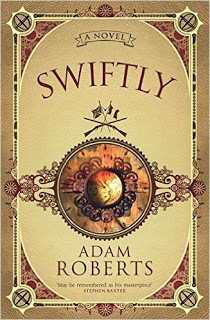 As I've mentioned before, after a long gap of not thinking much of contemporary science fiction writers, I have hit on two - Adam Roberts and the late lamented Iain M. Banks - who for me represent the best that SF has to offer. I got a whole pile of their books for Christmas and review two here. In each case, these happen to be the worst book by this author I've read. By most people's standards they're good, but - to me - weren't quite up to the usual incredibly high quality. This is no surprise - I've never seen an author who didn't have ups and downs.
As I've mentioned before, after a long gap of not thinking much of contemporary science fiction writers, I have hit on two - Adam Roberts and the late lamented Iain M. Banks - who for me represent the best that SF has to offer. I got a whole pile of their books for Christmas and review two here. In each case, these happen to be the worst book by this author I've read. By most people's standards they're good, but - to me - weren't quite up to the usual incredibly high quality. This is no surprise - I've never seen an author who didn't have ups and downs.We'll start with Adam Roberts and Swiftly. As usual with Roberts this is an exploration of an audacious idea - in this case, we are in a world where the various species from Swift's Gulliver's Travels (see what he did with the title?) are real and encroaching on business and life in Victorian Britain. Of itself this is wonderfully imagined - the abuse, for example of Lilliputians (or their neighbours Blefuscudians, who have to repeatedly point out they aren't Lilliputians) to perform extremely detailed work in factories is brilliant. And the employment in war by the French of giants from Brobdingnag who reluctantly help them to partially conquer the UK, helped by Babbage engines with a twist, is equally clever.
However, Roberts also introduces other layers, going bigger and smaller than Swift's variants, with a destructive ultra giant in a spaceship and a plague caused by tiny creatures that wipes out large swathes of humanity. As is almost always the case with disaster stories, the result is a depersonalisation of the storyline where I find it hard to identify much with what's going on. And though the main characters survive the plague, they too remain a little distant and untouchable, in part because Roberts in probably trying to give them period sensibilities, which mix with some more modern viewpoints that sit a little uncomfortably. In the end, the latter part of the book, a seemingly endless trek from London to York for what felt like no good reason, dragged a lot. I'm glad I read Swiftly, but I can't imagine reading it again, where most of Roberts' books are high on my list for repeated consumption.
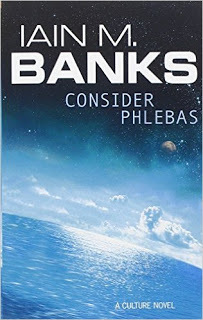 The other title that didn't quite work for me was Iain M. Banks' Consider Phlebas. The absolute joy and totally original creation of his science fiction books is the Culture. This hedonistic, clever, human and machine, seemingly anarchistic yet superbly functional empire without an emperor is a work of creative genius and in most of his Culture books it is front and centre. One of the problems with Consider Phelbas is that, although the Culture has a presence throughout as one side in a war, the book isn't about the Culture but rather an individual and his crusade against the Culture, which he feels is ultimately wrong for humanity. Because of this, he sides with the three-legged species with which the Culture is reluctantly at war.
The other title that didn't quite work for me was Iain M. Banks' Consider Phlebas. The absolute joy and totally original creation of his science fiction books is the Culture. This hedonistic, clever, human and machine, seemingly anarchistic yet superbly functional empire without an emperor is a work of creative genius and in most of his Culture books it is front and centre. One of the problems with Consider Phelbas is that, although the Culture has a presence throughout as one side in a war, the book isn't about the Culture but rather an individual and his crusade against the Culture, which he feels is ultimately wrong for humanity. Because of this, he sides with the three-legged species with which the Culture is reluctantly at war.The result is that the book descends into baroque space opera pure and simple, where Banks' books are usually far more, even though they use all of the language and paraphernalia of the space opera genre. If you enjoy pure space opera, this will be good news - but it's rarely my thing. There's an element of a quest story, but an awful lot of set piece battles and unpleasant scenes where the protagonist comes close to death in sadistic ways. Though there are brief asides set in the Culture (and one ambiguous Culture central character), they feel tacked on and don't particularly add to the story. I'm afraid it also felt far too long and some of the set pieces - notably when the mega ship hits the ice - were hard to follow descriptively. I've been fascinated by every Culture book I've read so far - but this one wasn't for me. I gather it was the first of the Culture novels, and it may be that the author was yet to settle into his stride.
Swiftly is available from amazon.co.uk and amazon.com.
Consider Phlebas is available from amazon.co.uk and amazon.com.
Published on January 19, 2017 00:37
January 17, 2017
Shock, horror, EU madness
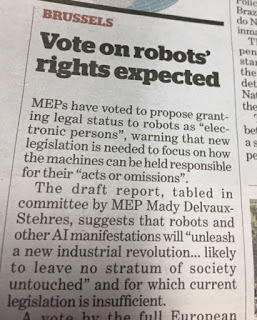 Unlike many of my social media friends, I am no fan of the European Union. Every direct contact I've ever had with the EU has involved ridiculous bureaucracy and vast amounts of wasted money. This has been everything from involvement in two large EU projects to something as simple as EHIC card, required to get healthcare in the EU - given I have an EU passport, why on Earth do I also need the costly (to the taxpayer) card, which has to be renewed every few years, as well?
Unlike many of my social media friends, I am no fan of the European Union. Every direct contact I've ever had with the EU has involved ridiculous bureaucracy and vast amounts of wasted money. This has been everything from involvement in two large EU projects to something as simple as EHIC card, required to get healthcare in the EU - given I have an EU passport, why on Earth do I also need the costly (to the taxpayer) card, which has to be renewed every few years, as well?However, if the news story illustrated is true, it seems that the European Parliament has sunk to the sort of levels that were mocked so effectively in Yes, Prime Minister. 'Electronic persons?' Really? Not only is it technologically ignorant - effectively they are considering legislating for science fiction - it's chauvinist, applying human labels to a totally different form of entity, even if robots were intelligent and conscious, which they aren't. I wonder if the MEPs have ever seen an actual robot?
I'm sorry, this is simply ridiculous.
Published on January 17, 2017 01:43
January 16, 2017
Keep your retail nose out, please
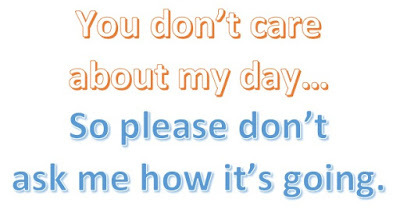 I don't know if it's some kind of New Year retail 'engage with the customer' exercise, but practically every shop I've been in so far this year has required me to fend off personal enquiries from the sales assistant. Let's be totally clear here. I do not want to tell you:
I don't know if it's some kind of New Year retail 'engage with the customer' exercise, but practically every shop I've been in so far this year has required me to fend off personal enquiries from the sales assistant. Let's be totally clear here. I do not want to tell you:What I've got planned for the dayIf I've got the day offIf I'm having a relaxing dayWhether I have a full calendarOr any other personal details of my lifeYou get the point. I go into a shop to buy something. I do not want a conversation. I do not want a fake friend pretending to take an interest in me. I have a life, but I have no interest in sharing it with a complete and often spotty stranger.
To be fair, I don't blame the sales assistants - they have no doubt been told to do this. But please be clear, retailers. Don't assume that all your customers want to share details of their day with complete strangers. Stop instructing your sales staff to ask about it. Or you are going to drive me entirely to online shopping.
Got it? Good. How's your day going so far, by the way?
Rant over.
Published on January 16, 2017 01:39
January 13, 2017
Dispatch, despatch, let's call the whole thing off
As a writer I'm interested in words, and I expect that most publishers have a similar affection, so I was slightly surprised when I got an invoice from Macmillan (I'd bought some copies of one of my books - someone has to) and found what appeared to me to be a spelling mistake. Here's what I saw:

The invoice used the spelling 'despatch' several times, yet I've always spelled the word 'dispatch'. As often happens at this point I had that nagging doubt I'd been doing it wrong all this time... so I hared off to that universal arbiter of all things wordly (sic), the Oxford English Dictionary.
Even though the dictionary gave both spellings, I was delighted to discover that my spelling is the more correct one - and the incorrect (sorry, less preferred) spelling seems to have been due to a late night on the part of Dr Johnson.
According to the OED, the word was always spelled 'dispatch' from its introduction until the early 19th century. However, Johnson use 'despatch' in his dictionary. This sounds almost certainly a mistake (we've all seen what he was like on Blackadder) - apparently Johnson only ever used 'dispatch' himself, as did all the authors cited by him, so it's hard to imagine it was intentional.
I leave the OED to give the final word: 'dispatch is to be preferred, as at once historical, and in accordance with English analogy; for even if this word had begun in Middle English with a form in des- from Old French (which it did not), it would regularly have been spelt dis- by 1500: see des- prefix, dis- prefix, prefixes.' Can't argue with that. So if you feel the urge to 'despatch', correct yourself immediately.

The invoice used the spelling 'despatch' several times, yet I've always spelled the word 'dispatch'. As often happens at this point I had that nagging doubt I'd been doing it wrong all this time... so I hared off to that universal arbiter of all things wordly (sic), the Oxford English Dictionary.
Even though the dictionary gave both spellings, I was delighted to discover that my spelling is the more correct one - and the incorrect (sorry, less preferred) spelling seems to have been due to a late night on the part of Dr Johnson.
According to the OED, the word was always spelled 'dispatch' from its introduction until the early 19th century. However, Johnson use 'despatch' in his dictionary. This sounds almost certainly a mistake (we've all seen what he was like on Blackadder) - apparently Johnson only ever used 'dispatch' himself, as did all the authors cited by him, so it's hard to imagine it was intentional.
I leave the OED to give the final word: 'dispatch is to be preferred, as at once historical, and in accordance with English analogy; for even if this word had begun in Middle English with a form in des- from Old French (which it did not), it would regularly have been spelt dis- by 1500: see des- prefix, dis- prefix, prefixes.' Can't argue with that. So if you feel the urge to 'despatch', correct yourself immediately.
Published on January 13, 2017 06:37
January 11, 2017
Should nits be picked?
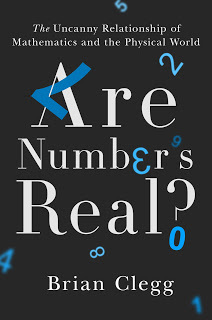 I suspect most authors get emails from readers that cause an initial surge of pleasure, followed by a sense of anxiety. They tend to have the format 'I am enjoying your book...' Good! '... but...' Ah.
I suspect most authors get emails from readers that cause an initial surge of pleasure, followed by a sense of anxiety. They tend to have the format 'I am enjoying your book...' Good! '... but...' Ah.I've just had the first of these for my new book Are Numbers Real and I wanted to share it, to consider whether sending this sort of email is a good idea or not.
My correspondent, Harvey Randall, started by saying he was enjoying the book, so I got my initial positive peak, but then he pointed out
However, there may be either a non sequitur or a typo on page 24...While there is no particular reason why the Roman and Arabic sums should have been the same one, so it's not strictly a non-sequitur, I suspect with the numbers so close it was a typo (I honestly can't remember what I intended), and I have requested a change for future printings.
The first line on the page, continuing the sentence on the previous page, states "... a simple rule) to add XXIII to XLIV for instance ... teach children how to add 23 to 45 ...."
I believe XLIV = Arabic 44.
On the one hand, then, this is a useful thing to do. It's good that we can correct the typo (though obviously nothing can be done for existing books in print), because errors distract some readers from the content, and though this particular one does not alter the message in any way, anything that causes a distraction weakens the book.
Now, every book I've ever read contains typos and errors - I always spot at least one, but I don't usually contact the author to tell them. (If I'm reviewing a book I do as a courtesy, but that's a bit different.) I think there are two reasons for this. One is I don't want to impose the same sickening drop of the stomach on discovering an error on another author - and the other is I think it makes me look a bit of a nit-picker. To be fair, anyone who knows me realises I am, like many with a scientific background, a serious nit-picker anyway, so perhaps this shouldn't bother me.
I don't think there is a cut and dried answer. I'm certainly not asking readers to stop pointing out errors - I always pass them on to the publisher (though I'm not sure the publisher always does anything with them), and I genuinely want my books to be as good as possible. But they aren't very nice emails to receive.
So if you do pick up a copy of Are Numbers Real , which I hope you will - it's taken off in the US faster than anything else I've written, and we'll have a UK edition in about three weeks' time (available for preorder) - please do feel free to point out any errors (though not this one). I will genuinely be grateful, if also a little sad.
Published on January 11, 2017 01:30



